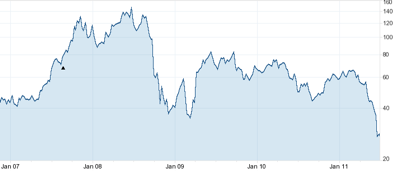Charlie Stross has been heads down writing for a while, but he must have his books in the bag because his blog is aflame again.
Naturally, knowing we crave red raw meat, he started with an attack on geek theology. He beat up on the Singularity.
Go read the essay. Here's my quick digest of his three arguments:
- We won't build super-intelligent sentient computers because .... well ... we just won't ... because .... we're not that stupid and it wouldn't serve any obvious purpose.
- Uploading consciousnesses won't work because we didn't evolve to be uploaded and religious sorts will object.
- We aren't living in a Simulation because ... well, we might be ... but it's not falsifiable so ...
Charlie! What happened? This is your most muddled essay in years.
Not to worry too much though. Charlie followed up with three excellent posts. I think he was just rusty.
See also:
- Aaronson critiques Kurzweil and the 2045 Singularity (2008)
- Signs of the singularity: science fiction gives up (a much better Stross essay, 2008)
- Churches of the Singularity - is Horgan truly an unbeliever? (2010)
- IEEE - The Singularity Issue (2008)
- Bayes theorem: binding reasoning to the physical universe (2007)
- SETI, the Fermi Paradox and The Singularity: Why our search for extraterrestial intelligence has failed (2000-2005)
- The Algebraist and the religion of the eternal simulation (2008, Iain M Banks)
- Are You Living in a Computer Simulation? (2004)
PS. Where am I on all things Skynet? I think we'll create artificial sentience and it will be the end of us. Unlike Charlie, I think there will be great economic advantages to push the limits of AI towards sentience, and we won't resist that. I'm very much hoping that is still 80 years away, but I'm afraid I might see it before I die. I think brain uploading is a hopeless dream. As for us living in a Simulation -- it does explain the Fermi Paradox ...

